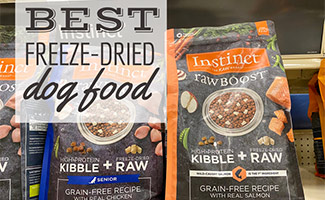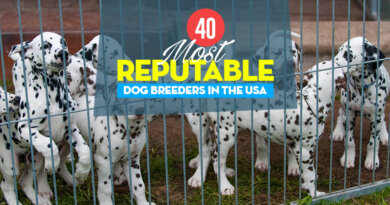How Do I Get My Puppy To Stop Chewing His Pee Pads?
This post may contain affiliate links. We may earn money or products from the companies mentioned in this post.
If you’re wondering what to do if your puppy tears up pee pads, you’ve come to the right place.
Puppy In Training founder Colby has raised over a dozen service dog puppies, and I’ve raised littermates and cared for lots of dog walking clients.
So yes, we’ve dealt with puppies chewing pee pads numerous times.
While it’s obviously a frustrating behavior, it can be downright dangerous too if your puppy eats pee pads!
Because here’s the thing: Puppy pee pads are designed to be used as a potty training aid, and not to be chewed. If they are, they can turn into an ingestion hazard, causing a potential blockage.
Not to mention that eating them instead of peeing on them disrupts the potty training progress!
Now having said that, there are effective techniques that keep puppies from chewing pee pads.
Lucky for you, we’ve compiled the most effective ones here in this comprehensive guide.
Ready to tackle this problem? Let’s get right down to business!
Why Does My Puppy Destroy Her Pee Pad?
Before we dive into the most effective strategies and tips to tackle this problem, let’s first understand that puppies explore the world with their mouths.
That’s a natural instinct all puppies are born with, and there’s nothing you can do to change that other than embrace it, and redirect it!
Having said that, puppy chewing ticks all of the following boxes:
- It reduces stress and anxiety
- It eases teething pain
- It fights boredom
So when your puppy is eating a pee pad, you’ll have to ask yourself what triggered it.
Are they simply bored and exploring ways to entertain themselves?
Are they teething and looking for something to soothe their pain with?
Or are they anxious and looking for ways to calm themselves down?
Once you’ve established the root cause, you can begin to tailor the training approach for your respective puppy.
How Do I Get My Puppy To Stop Chewing His Pee Pads
With that in mind, here are 7 pieces of advice that should help you get your puppy to stop chewing his pee pads!
1. Secure The Edges Of The Pee Pad
If your puppy is tempted by the edges of the pads, your first course of action should be to secure them.
You can do that a couple of different ways.
One option is to use duct tape all around the pee pad.
However, that’s only going to work if you place your puppy pee pads on a hard surface like tile and laminate.
If you use duct tape on hardwood floors, it leaves a residue that’s hard to clean – been there, done that, and I don’t recommend it unless you like lengthy cleaning chores!
So if you want to secure puppy pee pads on hardwood floors or carpet, a specific puppy pee pad holder is going to be a better option.
These pee pad holders have latches that hold the puppy pads in place without damaging your floors.
2. Provide Appropriate Chew Toys
Next, make sure to offer your little furry friend specific puppy chew toys.
That way, they’re much less likely to chew on inappropriate things such as their puppy pee pads.
Since their teething pain doesn’t stop until all of their adult teeth come in, they need an outlet for their pain until then.
That’s usually around 6 months of age.
Now, our favorite puppy chew toys are the following:
Tips: Filled Kongs last the longest if you freeze them for a few hours, plus the cold sensation soothes their teething pain!
You can also use empty Kongs to make bully stick last longer. Here’s how.
My puppies Missy & Buzz loved their frozen Kongs when their adult teeth came in, so I made sure to always keep several in the freezer section of my fridge.
If you want to add some plush fun for your puppy too, consider getting them the Hide-A-Squirrel plush dog toy.
It’s available in 4 different sizes, includes 5 plush squirrels and you have the option to buy replacement animals.
Why do we suggest all these different puppy chew toys?
Because ideally, you’ll want to rotate them so your puppy doesn’t get bored with one chew toy.
Some puppies also favor one material over another, so we suggest you try a few different ones until you’ve found a few favorites you can rotate between.
By rotating, we mean that you offer them a different chew toy every couple days.
If you give them access to all of their chew toys at once, you risk what we call “toy fatigue”, which means your pup won’t be playing with or chewing on any of them.
3. Positive Reinforcement Training
Additionally, when you’re working on teaching your puppy not to chew on their pee pads, you’ll want to praise them for chewing on their puppy chew toys instead.
You can say things like Good boy/girl, Yes, or Good job, puppy!
Always remember to use an upbeat, happy voice when you praise your puppy.
In dog training, this approach is known as positive reinforcement training.
4. Supervise and Redirect
Also, you’ll have to supervise your puppy to stop them from chewing his pee pads!
Once you catch them in the act of chewing the pee pads, say NO in a firm way, but without yelling.
Next, offer them a puppy chew toy instead.
When your puppy starts chewing on the chew toy and leaves the pee pads alone, shower them with verbal praise.
That lets them know that you’re happy with their choice.
If your puppy doesn’t seem interested in the chew toy, try to offer them a different one.
For example, if they don’t seem interested in a rubber chew, try offering them an edible chew like a bully stick or a filled Kong.
If they’re not interested in edible chew toys either, try to engage them in playtime instead.
As a last resort, you’ll have to physically remove them from the pee pad, either with a leash or by carrying them.
5. Introduce The “Leave It” Command
It’s never too early to teach your dog to “leave it”, and puppyhood is a prime time for learning this command.
An easy way to teach the “leave it” command is when your puppy is leashed.
So leash your puppy and walk up to the pee pad.
Watch your puppy closely and right before they’re about to begin chewing on the pee pad, say “leave it” and walk them away.
Reward them for being such a good puppy! You can either give them a tasty bite of something extra good (tiny bits of cheese or hot dog) or praise them verbally.
I used both approaches with my puppies.
Repeat this exercise 3 to 4 times, then take a break.
You’ll want to practice this command (and others) on a daily basis to reinforce its effectiveness.
Tip: Keep a small sandwich ziplock bag in your fridge that you fill with tiny cuts of cheese and hot dogs. That way, you can easily grab them for your training sessions.
That said, consistency and patience are the key to successful dog training!
6. Use Bitter-Tasting Deterrents
As an additional incentive to get your puppy to stop chewing his pee pads, you can also apply some bitter-tasting spray for dogs on the edges of the pee pads.
The strong smell and taste deters many puppies from chewing, although some do persist, and unfortunately, my puppies belonged in that category.
For those puppies, try a mixture of water and white vinegar. Fill it into a spray bottle and apply it to the edges of the pee pads. For Missy and Buzz, this approach worked better.
7. Consider Reusable Puppy Pee Pads
For very determined puppies, you may have to replace the disposable puppy pee pads with a more rigid solution.
For example, washable puppy pee pads or washable puppy grass mats.
One of my dog walking clients ended up using washable puppy pee pads instead of the disposable ones because her Morkie puppy Madison kept chewing them!
Madison on her reusable puppy pad
Bottom Line
We hope that you found an answer to your question “How do I get my puppy to stop chewing his pee pads?”
Remember, if you notice that your puppy is showing a strong desire to chew their pads, you can try several different approaches to stop them:
- Secure the edges with tape
- Use a puppy pee pad holder
- Spray the edges with bitter spray for dogs
- A mix of water and white vinegar may work as well
- Provide your puppy with appropriate puppy chew toys
- Consider replacing disposable pads with washable ones
- Supervise and redirect your puppy using positive reinforcement
- Start teaching your puppy the “leave it” command by practicing daily
We really can’t stress the importance of providing appropriate chew toys enough given your puppy’s teething pain and their natural urge to chew.
But also, don’t forget to rotate the chew toys, and keep a few frozen Kongs in your freezer at all times during your puppy’s teething phase.
Paired with consistent training and supervision, this should help your puppy break the habit of chewing on his pee pads soon!
Save To Pinterest
Top Picks For Our Puppies
- BEST PUPPY TOY
We Like: Calmeroos Puppy Toy w/ Heartbeat and Heat Packs – Perfect for new puppies. Helps ease anxiety in their new home. - BEST DOG CHEW
We Like: Mighty Paw Naturals Bully Sticks – All of our puppies love to bite, nip, and chew. We love using Bully Sticks to help divert these unwanted behaviors. - BEST DOG TREATS
We Like: Crazy Dog Train-Me Treats – We use these as our high-value treats for our guide dog puppies. - BEST FRESH DOG FOOD
We Like: The Farmer’s Dog – A couple months ago we started feeding Raven fresh dog food and she loves it! Get 50% off your first order of The Farmer’s Dog.
Check out more of our favorites on our New Puppy Checklist.




